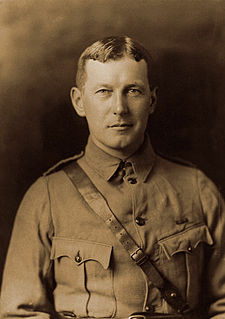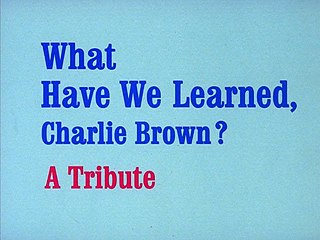
"In Flanders Fields" is a war poem in the form of a rondeau, written during the First World War by Canadian physician Lieutenant-Colonel John McCrae. He was inspired to write it on May 3, 1915, after presiding over the funeral of friend and fellow soldier Lieutenant Alexis Helmer, who died in the Second Battle of Ypres. According to legend, fellow soldiers retrieved the poem after McCrae, initially dissatisfied with his work, discarded it. "In Flanders Fields" was first published on December 8 of that year in the London magazine Punch. Flanders Fields is a common English name of the World War I battlefields in Belgium and France.

A poppy is a flowering plant in the subfamily Papaveroideae of the family Papaveraceae. Poppies are herbaceous plants, often grown for their colourful flowers. One species of poppy, Papaver somniferum, is the source of the narcotic drug opium which contains powerful medicinal alkaloids such as morphine and has been used since ancient times as an analgesic and narcotic medicinal and recreational drug. It also produces edible seeds. Following the trench warfare in the poppy fields of Flanders, Belgium during World War I, poppies have become a symbol of remembrance of soldiers who have died during wartime, especially in the UK, US, and Canada.

Lieutenant-Colonel John McCrae was a Canadian poet, physician, author, artist and soldier during World War I, and a surgeon during the Second Battle of Ypres, in Belgium. He is best known for writing the famous war memorial poem "In Flanders Fields". McCrae died of pneumonia near the end of the war.

Papaver rhoeas, with common names including common poppy, corn poppy, corn rose, field poppy, Flanders poppy, and red poppy, is an annual herbaceous species of flowering plant in the poppy family Papaveraceae. It is notable as an agricultural weed. Especially in the Commonwealth, it is used a symbol of remembrance of the fallen soldiers and other military, during World War I and thereafter.
The Haig Fund is a charity set up in 1921 by Field Marshal Douglas Haig, 1st Earl Haig.

Flanders Field American Cemetery and Memorial is a World War I cemetery in the city of Waregem, Belgium. Originally a temporary battlefield burial ground, Flanders Field American Cemetery later became the only permanent American World War I cemetery in Belgium. The Flanders Field American Cemetery commemorates 411 service members of the United States Armed Forces of which 368 are interred. The Walls of the Missing inside the chapel venerates 43 missing service members.
A rondeau is a form of medieval and Renaissance French poetry, as well as the corresponding musical chanson form. Together with the ballade and the virelai it was considered one of the three formes fixes, and one of the verse forms in France most commonly set to music between the late 13th and the 15th centuries. It is structured around a fixed pattern of repetition of material involving a refrain. The rondeau is believed to have originated in dance songs involving alternating singing of the refrain elements by a group and of the other lines by a soloist. The term "Rondeau" is today used both in a wider sense, covering several older variants of the form – which are sometimes distinguished as the triolet and rondel – and in a narrower sense referring to a 15-line variant which developed from these forms in the 15th and 16th centuries. The rondeau is unrelated with the much later instrumental dance form that shares the same name in French baroque music, which is an instance of what is more commonly called the rondo form in classical music.
The game of cricket has inspired much poetry, most of which romanticises the sport and its culture.

What Have We Learned, Charlie Brown? A Tribute is the 26th prime-time animated television special based upon the comic strip Peanuts, by Charles M. Schulz, who introduced the special. It originally aired on the CBS network on May 30, 1983, Memorial Day in the United States, and one week prior to the 39th anniversary of the D-Day Invasion. It aired on CBS only one other time, on May 26, 1984, which was the Saturday before Memorial Day, and ten days prior to the 40th anniversary of the D-Day Invasion.

The remembrance poppy is an artificial flower worn in some countries to commemorate their military personnel who died in war. Veterans' associations exchange poppies for charitable donations used to give financial, social and emotional support to members and veterans of the armed forces.

A Christian child's prayer is Christian prayer recited primarily by children that is typically short, rhyming, or has a memorable tune. It is usually said before bedtime, to give thanks for a meal, or as a nursery rhyme. Many of these prayers are either quotes from the Bible, or set traditional texts.
Walter Cuthbert Blythe is a fictional character in Lucy Maud Montgomery's Anne of Green Gables series. He appears as a major character in three books; within the series chronology, they are Anne of Ingleside, Rainbow Valley and Rilla of Ingleside. Walter appears briefly and is also frequently alluded to in the final volume of the series, The Blythes Are Quoted, in which several of his poems are printed in full and discussed by members of his family.

Nationality words link to articles with information on the nation's poetry or literature.

Flanders Fields is a common English name of the World War I battlefields in an area straddling the Belgian provinces of West Flanders and East Flanders as well as the French department of Nord-Pas-de-Calais, part of which makes up the area known as French Flanders.

George Harold Baker was a lawyer, political figure, and soldier from Quebec, Canada. He represented Brome in the House of Commons of Canada from 1911 to 1916 as a Conservative Member of Parliament.

DeWitt Clinton Park is a 5.8-acre (23,000 m2) New York City public park in the Hell's Kitchen neighborhood of Manhattan, New York City, between West 52nd and 54th Streets, and Eleventh and Twelfth Avenues.

Moina Belle Michael was an American professor and humanitarian who conceived the idea of using poppies as a symbol of remembrance for those who served in World War I.
Lillian Bilsky Freiman, nicknamed The Poppy Lady, was a Jewish-Canadian philanthropist, and Zionist. In 2008, she was designated a Person of National Historic Significance by the Canadian Government for being "a gifted organizer and philanthropist who worked to improve the health and welfare of her fellow citizens."

The Great War Symphony is a choral symphony by the British composer Patrick Hawes written to commemorate the centenary of the First World War.

Hillcrest Veterans Square is a triangle-shaped public park located in Fresh Meadows, Queens, New York City. The square contains a monument erected by Hillcrest Post No. 1078 of the American Legion. In 2005, the park’s original monument to the veterans was replaced by a more detailed design. The new monument contains a plaque from the original monument along with excerpts from the poem “We Shall Keep the Faith” by Moina Michael. Its mention of the poppies growing in Flanders Fields inspired use of this flower as a symbol of remembrance for those who fought in the First World War. In addition to the monument, Hillcrest Veterans Square contains a flagpole and a red maple tree.














